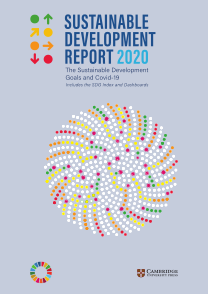
EIB survey: 27% of European firms see transition to net-zero economy as opportunity in coming 5 years
The Investment Survey 2024 – conducted by the European Investment Bank (EIB) – showed that ...

Egypt came in the 83rd position in the Sustainable Development Report 2020, moving up nine spots. The report assesses all 166 states.
The report represents a global assessment of countries’ progress towards achieving the Sustainable Development Goals (SDGs).
The report – issued on June 30, 2020 – was prepared by teams of independent experts at the Sustainable Development Solutions Network (SDSN) and the Bertelsmann Stiftung.
The top ten countries are Sweden, Denmark, Finland, France, Germany, Norway, Austria, Czech Republic, Netherlands and Estonia.
Algeria came in the 56th position, while Tunisia ranked 63rd, followed by Morocco 64th.
Oman came in the 76th position, Bahrain in the 82nd, Jordan in the 89th and Lebanon in the 95th.
Kuwait ranked 112th, followed by Iraq number 113th.
Syria ranked 126th, while Yemen came at the tail of the Arab countries list raking number 151st.
Ghana came in the 100th position, while Mauritius in the 108th, South Africa in the 110th and Gabon in the 111th.
Namibia ranked 119th, Kenya 123rd, Zimbabwe 125th, Senegal 127th, Cote d’Ivoire 128th, Gambia 129th, Mauritania 130th, Tanzania 131st, Rwanda 132nd, Cameroon 133rd, Congo 135 and Ethiopia 136th.
The report included many other African states, like Sudan, Togo, Guinea, Malawi, Somalia and Central Africa.
The report highlighted that Covid-19 has severe negative impacts on most the 17 United Nations Sustainable Development Goals (SDGs).
The report added that the world is facing the worst public health and economic crisis in a century. The health crisis is affecting all countries, including high-income countries in Europe and North America.
The necessary measures taken to respond to the immediate threat of Covid‑19, including the shutdown of many economic activities for weeks, have led to a global economic crisis with massive job losses and major impacts especially on vulnerable groups. This is a significant setback for the world’s ambition to achieve the SDGs, in particular for poor countries and population groups.
The only bright spot in this foreboding picture is the reduction in environmental impacts resulting from declines in economic activity: a key objective will be to restore economic activity without simply restoring old patterns of environmental degradation.
The report underlined that all countries need to strengthen the resilience of their health systems and prevention programs.
In line with SDG 3 (Good Health and Well-Being), all countries need to “Strengthen the capacity for early warning, risk reduction and management of national and global health risks,” the report said.
This crisis shows that better measures and reporting are needed to track prevention programs and health care system preparedness and resilience to pandemics, according to the report.
As the international community, regional organizations, and countries plan the post-Covid-19 recovery, it will be important to put the SDGs at the heart of policymaking. Covid-19 does not resolve the climate and biodiversity crises and is gravely amplifying income inequalities and other forms of inequalities.
It also demonstrates that countries will only be able to protect themselves from global pandemics if health systems are strengthened in every country. The SDR2020 shows that significant progress was achieved in many regions and on many goals over the past five years.
The report identified five key measures that global cooperation should include; namely disseminating best practices rapidly, strengthening financing mechanisms for developing countries, addressing hunger hotspots; ensuring social protection and promoting new drugs and vaccine.
The Investment Survey 2024 – conducted by the European Investment Bank (EIB) – showed that ...
About 73% of online shoppers want to know the CO2 emissions of their deliveries, and ...
A major new study reveals that carbon dioxide (CO2) emissions from forest fires have surged ...


اترك تعليقا